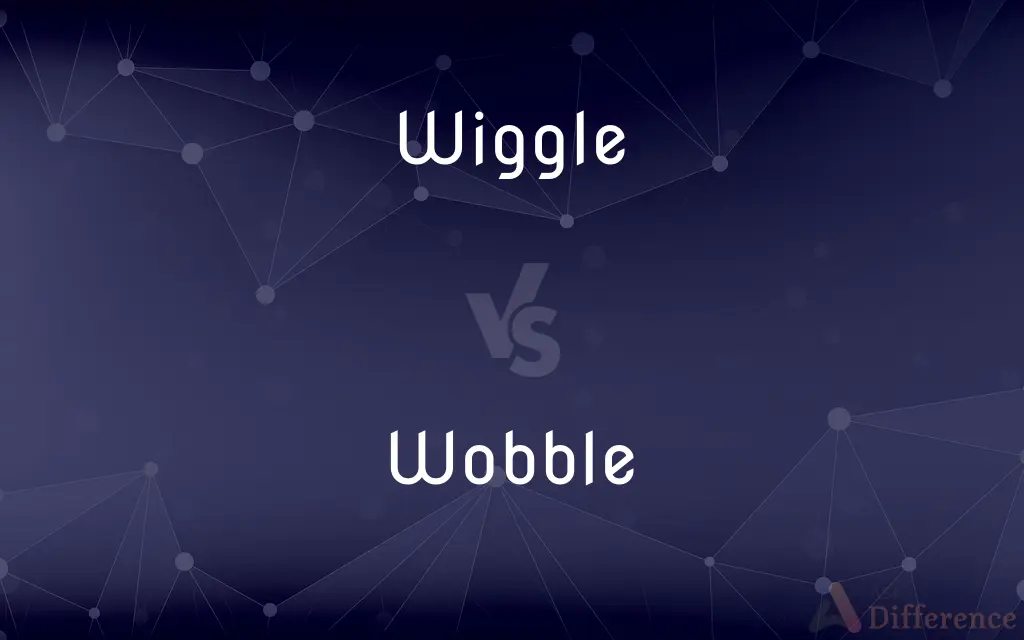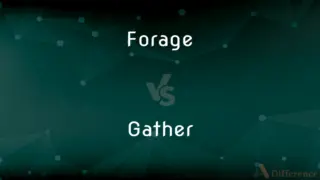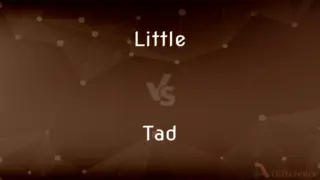Wiggle vs. Wobble — What's the Difference?
By Fiza Rafique & Maham Liaqat — Updated on April 8, 2024
Wiggle involves small, rapid movements from side to side or up and down, while wobble denotes unsteady, teetering movements often signaling a lack of balance.

Difference Between Wiggle and Wobble
Table of Contents
ADVERTISEMENT
Key Differences
Wiggle typically refers to quick, small movements back and forth or side to side, often seen as playful or indicative of trying to adjust or get comfortable. For example, one might wiggle their toes in the sand or wiggle in their seat to find a more comfortable position. Whereas wobble suggests a less controlled, shaky movement, often conveying instability or a struggle to maintain balance. A table with uneven legs or a person trying to stand on one foot might wobble, indicating potential collapse or fall.
Wiggling is often a deliberate action, used to express eagerness, impatience, or discomfort. For instance, a child might wiggle with excitement when anticipating a treat. On the other hand, wobbling is generally involuntary, resulting from external forces or internal imbalance. This could be due to poor construction, as in the case of furniture, or physical challenges, as when standing in a moving bus.
The connotations of wiggle are generally neutral or positive, associated with vibrancy and liveliness. It suggests activity within a confined space or condition. Whereas wobbling often carries negative connotations, associated with uncertainty, weakness, or imminent failure, as it suggests a precarious state that could lead to an undesirable outcome.
In terms of motion, wiggling requires a pivot point or a part of the body to stay relatively fixed while other parts move. This is common in animals and humans, such as when a dog wiggles its tail. Wobble, however, involves the entire object or body in motion, often struggling to find a point of balance or stability.
The purpose behind a wiggle is often to adjust, signal, or entertain, serving as a form of non-verbal communication or a way to achieve comfort. In contrast, a wobble usually indicates a problem or a need for correction, such as fixing a wobbly chair or improving one's balance to avoid falling.
ADVERTISEMENT
Comparison Chart
Definition
Small, rapid movements from side to side or up and down.
Unsteady movements, often signaling a lack of balance.
Voluntariness
Often deliberate and controlled.
Generally involuntary, indicating instability.
Connotation
Neutral or positive, associated with liveliness.
Often negative, suggesting uncertainty or weakness.
Motion Requirement
Requires a part to remain fixed while others move.
Involves the entire object or body struggling for stability.
Purpose
To adjust, signal, or entertain.
Indicates a problem or need for correction.
Compare with Definitions
Wiggle
A playful or eager movement.
The child wiggled with anticipation.
Wobble
Reflecting imbalance or difficulty in maintaining position.
The cyclist wobbled on the steep hill.
Wiggle
To move with small, rapid movements.
The puppy wiggled its tail excitedly.
Wobble
A shaky or trembling motion.
Her voice wobbled with emotion.
Wiggle
Expressing through subtle movements.
She wiggled her eyebrows suggestively.
Wobble
To move unsteadily from side to side.
The table wobbled on the uneven floor.
Wiggle
Adjusting position by moving slightly.
He wiggled in his chair to get comfortable.
Wobble
Lacking firmness or steadiness.
The uncertain plan began to wobble under scrutiny.
Wiggle
A quick, side-to-side movement.
She gave a little wiggle of her fingers to say goodbye.
Wobble
Indicative of potential falling or collapsing.
He wobbled but managed not to fall.
Wiggle
To move back and forth with quick irregular motions
The gelatin wiggled on the plate.
Wobble
To move or rotate with an uneven or rocking motion or unsteadily from side to side.
Wiggle
To move or proceed with a twisting or turning motion; wriggle
Wiggled restlessly in her chair.
Wiggled through the crowd.
Wobble
To tremble or quaver
The child's voice wobbled with emotion.
Wiggle
To insinuate or extricate oneself by sly or subtle means
Wiggled out of a social engagement.
Wobble
To waver or vacillate in one's opinions or feelings.
Wiggle
To cause to move back and forth with quick irregular motions
Wiggle a loose tooth.
Wobble
To cause to wobble.
Wiggle
To make (one's way, for example) by or as if by wiggling
The pitcher wiggled his way out of a jam.
Wobble
The act or an instance of wobbling; unsteady motion.
Wiggle
A wiggling movement or course.
Wobble
A tremulous, uncertain tone or sound
A vocal wobble.
Wiggle
To move with irregular, back and forward or side to side motions; To shake or jiggle.
Her hips wiggle as she walks.
The jelly wiggles on the plate when you move it.
Wobble
An unsteady motion.
The fat man walked down the street with a wobble.
Wiggle
(figurative) An alternating state or characteristic. en
Wobble
A tremulous sound.
There was a wobble on her high notes.
Wiggle
(in the plural) See wiggles.
Wobble
(music) A low-frequency oscillation sometimes used in dubstep
Wiggle
To move to and fro with a quick, jerking motion; to bend rapidly, or with a wavering motion, from side to side; to wag; to squirm; to wriggle; as, the dog wiggles his tail; the tadpole wiggles in the water.
Wobble
(genetics) A variation in the third nucleotide of a codon that codes for a specific aminoacid
Wiggle
Act of wiggling; a wriggle.
Wobble
(intransitive) To move with an uneven or rocking motion, or unsteadily to and fro.
The Earth wobbles slowly on its axis;
The jelly wobbled on the plate
Wiggle
The act of wiggling
Wobble
(intransitive) To tremble or quaver.
The soprano's voice wobbled alarmingly.
Wiggle
Move to and fro;
Don't jiggle your finger while the nurse is putting on the bandage!
Wobble
(intransitive) To vacillate in one's opinions.
I'm wobbling between the Liberals and the Greens.
Wobble
(transitive) To cause to wobble.
The boy wobbled the girl's bike.
Wobble
See Wabble.
Wobble
An unsteady rocking motion
Wobble
Move unsteadily;
His knees wobbled
The old cart wobbled down the street
Wobble
Move sideways or in an unsteady way;
The ship careened out of control
Wobble
Tremble or shake;
His voice wobbled with restrained emotion
Common Curiosities
What does wobble indicate?
It indicates instability or an unsteady state, often leading to potential imbalance or fall.
What does it mean to wiggle?
To make small, rapid movements back and forth or side to side.
Can objects both wiggle and wobble?
Yes, depending on the context, but wiggling usually implies deliberate movements, while wobbling suggests instability.
Is wiggling always intentional?
Often, but not always; it can be a reflex or unconscious movement.
Can wobbling be corrected?
Yes, by addressing the underlying cause of instability.
Is wiggling a form of communication?
Yes, it can express eagerness, discomfort, or serve as non-verbal cues.
How do animals use wiggling?
As a playful gesture, to get comfortable, or to express excitement.
Are wiggles always fast?
Typically, but they can vary in speed depending on context.
How does the purpose of wiggling differ from wobbling?
Wiggling is for adjustment or communication, while wobbling indicates a need for correction or stability.
Why do objects wobble?
Due to uneven forces or lack of balance.
What is the difference in movement between wiggle and wobble?
Wiggling involves parts moving around a fixed point; wobbling involves the entire structure or body.
Can wobbling be a sign of danger?
Yes, if it indicates a significant risk of falling or collapsing.
What are common causes of wobbling?
Uneven surfaces, weak structures, or internal imbalances.
What emotions can wobbling convey?
Nervousness, fear, or emotional instability.
Can humans wiggle and wobble?
Yes, in different contexts, indicating either playful movement or instability.
Share Your Discovery

Previous Comparison
Forage vs. Gather
Next Comparison
Little vs. TadAuthor Spotlight
Written by
Fiza RafiqueFiza Rafique is a skilled content writer at AskDifference.com, where she meticulously refines and enhances written pieces. Drawing from her vast editorial expertise, Fiza ensures clarity, accuracy, and precision in every article. Passionate about language, she continually seeks to elevate the quality of content for readers worldwide.
Co-written by
Maham Liaqat















































